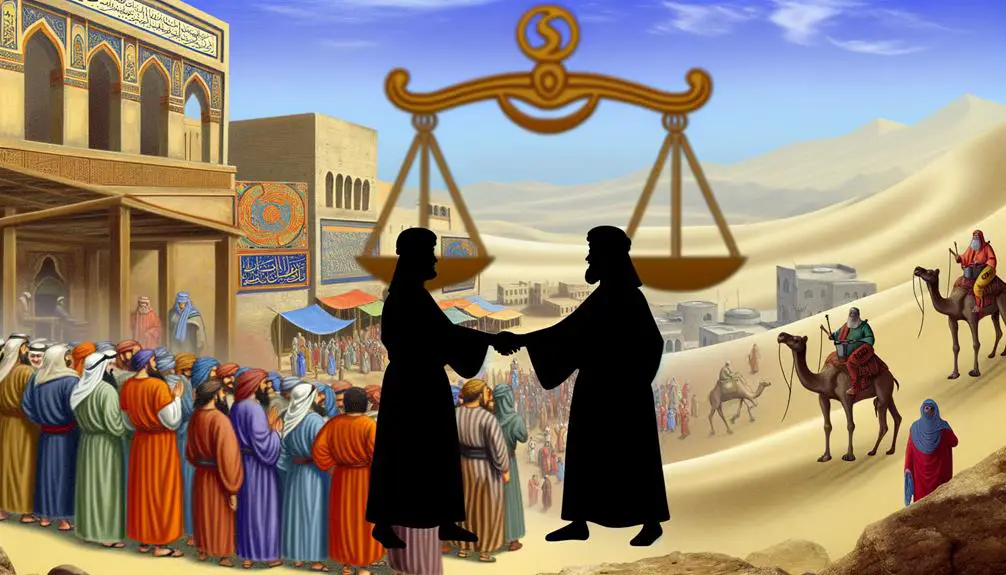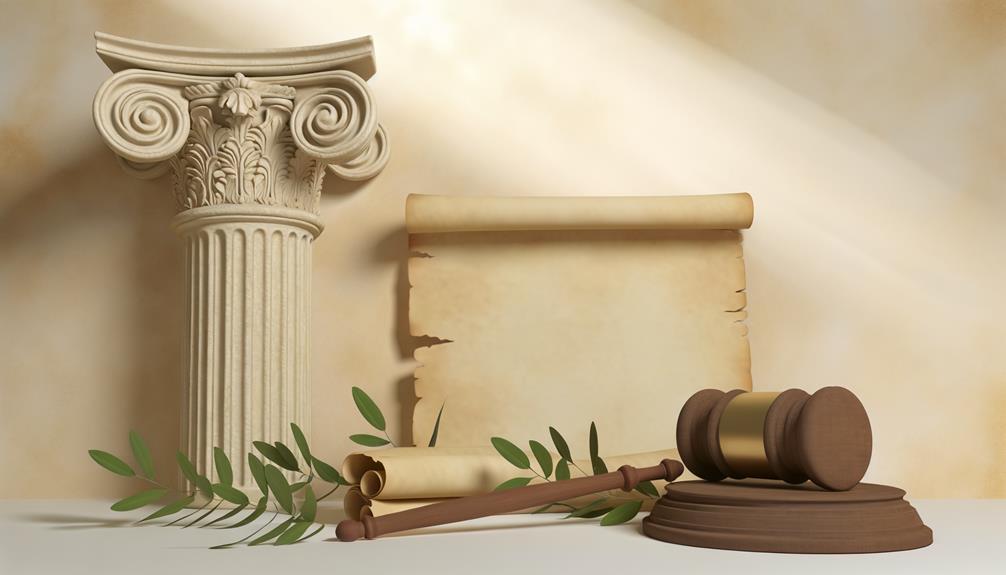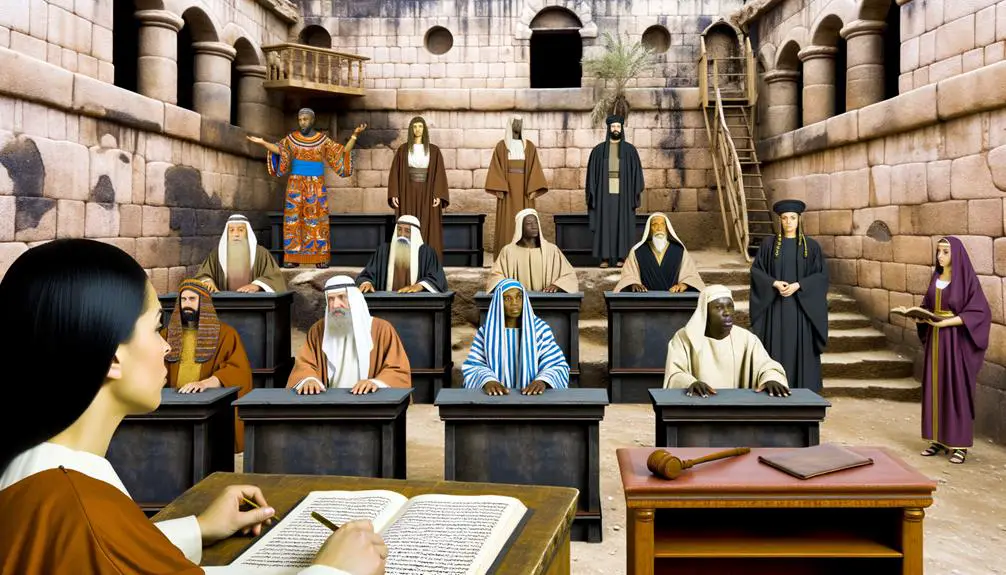Navigate the intriguing world of biblical lawsuits to discover ancient wisdom on justice and conflict resolution—what secrets do these stories hold?

Lawsuits in the Bible
Consider Solomon's wise decision in the famous case of the two women claiming the same baby. This example illustrates the deep roots of legal disputes and their resolution in biblical times.
As you explore the Mosaic Law on litigation, Solomon's judicial wisdom, and Paul's advice on lawsuits among believers, you'll uncover a rich tapestry of legal thought that has influenced modern legal systems.
The Bible's perspectives on justice, conflict resolution, and the role of courts invite you to consider how ancient wisdom can inform contemporary legal practices. What might these biblical precedents teach us about handling disputes today?
Key Takeaways
- Biblical texts prioritize forgiveness and mediation over litigation in resolving disputes.
- Ancient Hebrew law underscores justice, fairness, and community restoration in legal matters.
- Jesus' parables and Paul's teachings advocate for ethical conduct and compassion in legal disputes.
- The Mosaic Law introduced principles of debt forgiveness and economic balance, influencing modern legal frameworks.
The Mosaic Law on Litigation

The Mosaic Law provides a detailed framework for litigation, guiding the Israelites on how to resolve disputes judiciously. As you delve into the intricacies of this ancient legal system, it's clear that its provisions weren't only about retribution but also about restoration and fairness. Central to its ethos were the concepts of debt forgiveness and respect for property boundaries, which played pivotal roles in maintaining societal balance and preventing conflicts.
Debt forgiveness, as mandated by the Mosaic Law, was a revolutionary concept aimed at preventing perpetual poverty and social stratification. Every seven years, debts were to be forgiven, ensuring that the economic burden didn't become a lifelong yoke for the debtor. This periodic reset promoted a spirit of generosity and community solidarity, discouraging exploitation and fostering a culture where compassion trumped greed. Analyzing this provision, you'll find it wasn't just about financial relief but about sustaining social harmony and giving every Israelite a chance for a fresh start.
Similarly, the laws concerning property boundaries were meticulously designed to protect individual rights and prevent disputes. Land was a crucial asset, and its ownership and boundaries were to be respected unequivocally. Altering landmarks or encroaching on another's property was strictly prohibited, reflecting a deep respect for personal and familial inheritance. This not only minimized conflicts but also ensured equitable distribution of land, reflecting a profound understanding of the importance of land for economic stability and community identity.
Solomon's Wisdom in Judicial Matters

Delving into King Solomon's reign, it becomes evident how his unparalleled wisdom revolutionized judicial proceedings, setting a precedent for fairness and integrity in dispute resolution. His tenure is marked by a series of diplomatic judgments and king's arbitrations that not only astounded his contemporaries but also provided a template for judicial wisdom and moral discernment in the handling of complex legal disputes.
Solomon's wisdom in judicial matters is most famously exemplified in the case of two women claiming to be the mother of the same child. His proposal to divide the child in half, knowing it would reveal the true mother's compassion, underscored his ability to penetrate beyond the surface of disputes to the heart of the matter. This incident, among others, highlights Solomon's use of psychological insight and understanding of human nature in rendering decisions.
Moreover, Solomon's judicial proceedings often underscored the importance of peace and reconciliation over strict legalism. His diplomatic judgments frequently aimed at restoring relationships rather than simply adjudicating rights and wrongs. This approach reflected a deep understanding of the social fabric and the need to maintain harmony within the community.
In essence, Solomon's legacy in judicial matters extends beyond the mere resolution of disputes. It encompasses a holistic view of justice, emphasizing wisdom, compassion, and the restoration of community. His reign, thus, offers invaluable insights into the principles of fairness and integrity that remain relevant in contemporary dispute resolution. Through his example, Solomon established a benchmark for judicial wisdom that transcends time and legal systems, underscoring the timeless value of understanding and empathy in the pursuit of justice.
Parables of Jesus on Legal Disputes

Through his parables on legal disputes, Jesus illuminated complex moral and ethical dilemmas, offering profound insights into the principles of justice and fairness. He skillfully used stories that resonated with the everyday experiences of his audience, embedding deep lessons within them. Particularly, his teachings on forgiveness emphasis and financial ethics stand out, demonstrating a radical departure from the purely legalistic approaches of his time.
- Forgiveness Emphasis: Jesus' parable of the unmerciful servant (Matthew 18:23-35) starkly highlights the importance of forgiveness in the context of legal disputes. He portrays a servant who, despite being forgiven a massive debt by his master, refuses to forgive a minor debt owed to him by a fellow servant. This story emphasizes the moral imperative of extending the grace we receive to others, especially in legal matters where the letter of the law might allow for harsh penalties.
- Financial Ethics: In the parable of the dishonest manager (Luke 16:1-13), Jesus explores the nuanced terrain of financial ethics. He presents a manager who, facing termination for mismanagement, reduces the debts of his master's debtors to secure their favor for his future. While not condoning dishonesty, Jesus uses this parable to challenge his audience to consider their attitudes toward wealth and the ethical implications of their financial decisions, especially in legal and business dealings.
- Principles of Justice and Fairness: Throughout his parables, Jesus advocates for a justice system underpinned by mercy and compassion rather than strict retribution. His teachings invite you to reflect deeply on the nature of justice, pushing for a balance between upholding the law and embodying grace in every judgment.
Paul's Advice on Lawsuits Among Believers

While Jesus used parables to elucidate principles of justice and forgiveness in legal disputes, Paul's epistles offer direct advice on handling lawsuits among believers. Delving into the heart of Christian unity, Paul's guidance isn't just about avoiding legal battles; it's a profound call for spiritual discernment within the community of faith.
Paul's counsel, deeply embedded in the fabric of early Christian teachings, underscores the imperative of resolving conflicts internally rather than airing disputes in secular courts. This approach isn't merely about preserving the public image of the Church but is fundamentally aimed at fostering a spirit of reconciliation and mutual understanding among believers. You'll find that Paul's arguments pivot on the belief that the wisdom endowed by the Spirit should enable Christians to arbitrate disputes among themselves, thus upholding the sanctity of brotherly bonds.
Analyzing Paul's advice, it's clear he sees lawsuits as symptomatic of a deeper spiritual malaise—a failure to embody the transformative power of the Gospel in interpersonal relationships. From this perspective, engaging in legal battles represents not just a breakdown in Christian unity but a lapse in spiritual discernment, where believers have lost sight of their higher calling in Christ.
In practical terms, Paul's teachings encourage you to seek godly counsel and mediation within the church community as a first recourse. This approach doesn't just offer a pathway to resolution but acts as a crucible for spiritual growth, challenging you to apply Christ's teachings on forgiveness and love even in the face of conflict and disagreement. Through this lens, Paul's advice transcends its historical context, offering timeless wisdom on navigating disputes with grace and discernment.
Ancient Hebrew Court Systems

You'll find that the Ancient Hebrew court systems were meticulously structured, with judicial roles clearly defined to ensure fairness and order. Trial procedures, as outlined in biblical texts, reveal a complex legal framework designed to handle disputes among the community members.
This examination will highlight the sophistication and detail inherent in these ancient judicial processes, setting a foundation for understanding biblical lawsuits.
Judicial Roles Defined
In ancient Hebrew court systems, roles and responsibilities were clearly delineated to ensure fairness and justice in legal proceedings. This structure was pivotal in upholding legal ethics and establishing a robust court hierarchy, pivotal elements in maintaining societal order and faith in the judicial system.
- Judges – Entrusted with interpreting the law, their role demanded not just knowledge but an unwavering commitment to justice and impartiality.
- Priests – They served as consultants on matters of religious law, ensuring that verdicts aligned with divine statutes.
- Elders – Representing the community's wisdom, their involvement guaranteed that decisions reflected societal values and norms.
These roles, deeply embedded in the fabric of ancient Hebrew society, underscored a profound respect for the law, fairness, and the moral fabric that held the community together.
Trial Procedures Explained
Having outlined the key roles within ancient Hebrew court systems, let's examine the specific trial procedures that ensured justice and fairness.
A critical aspect was courtroom attire, which wasn't merely about decorum but served to minimize social biases, ensuring that judges focused on the case's merits rather than the parties' status.
Witness credibility, a cornerstone of these proceedings, was rigorously assessed. Witnesses were subject to meticulous questioning, with their integrity being paramount for the trial's outcome.
Cross-examination was a vital tool in this process, designed to unearth the truth and gauge consistency in testimonies.
This meticulous approach underscores how ancient Hebrew law prioritized a thorough and equitable examination of facts, embodying principles of justice that remain relevant today.
Prophets' Views on Justice and Law

You'll find that biblical prophets often emphasized justice principles and divine law interpretations as core elements of societal governance.
They advocated for a justice system that not only adhered to divine commands but also sought equity and protection for the marginalized.
Analyzing their teachings provides critical insights into the complex interplay between divine injunctions and human legal practices.
Prophetic Justice Principles
The prophets of the Bible articulated principles of justice and law that emphasize fairness, compassion, and accountability within the community. Their teachings delve into the ethical implications and societal impacts of justice, urging a balance that fosters peace and equity.
- Empathy towards the marginalized: They championed the cause of the poor and disenfranchised, highlighting the moral duty to protect the vulnerable.
- Integrity in leadership: The prophets demanded honesty and integrity from leaders, condemning corruption and exploitation.
- Collective responsibility: They underscored the community's role in upholding justice, emphasizing that societal well-being hinges on the collective uprightness.
These principles offer a timeless framework, challenging you to reflect on current justice systems and their alignment with these ancient yet profoundly relevant standards.
Divine Law Interpretations
In exploring the prophets' views on justice and law, one discovers a profound interpretation of divine mandates that shaped societal norms and individual behaviors throughout biblical times. These interpretations often emphasized covenant consequences and sacrificial ordinances, highlighting the intricate relationship between divine commandments and human accountability.
Prophets articulated that adherence to sacrificial ordinances wasn't merely ritualistic but symbolized deeper repentance and commitment to divine laws. They warned of severe covenant consequences for neglect or violation, positioning these outcomes not as arbitrary punishments but as natural repercussions of straying from a divinely ordained path.
This perspective underscores a nuanced understanding of justice, where divine and human realms intertwinely dictate the principles governing societal order and individual conduct.
Resolving Conflicts Outside Court

Resolving conflicts outside court, biblical directives often encourage individuals to seek amicable solutions through dialogue and mediation before pursuing legal action. This approach not only aligns with spiritual teachings but also offers practical advantages. Key among these are mediation techniques and arbitration benefits, which both aim to foster understanding and agreement without the adversarial nature of court proceedings.
Mediation techniques, grounded in biblical principles, involve a neutral third party facilitating a dialogue between disputing parties to help them find a mutually satisfactory resolution. This process emphasizes active listening, empathy, and compromise, reflecting the core values of compassion and reconciliation taught in the scriptures.
Arbitration benefits, on the other hand, include a more structured resolution process, albeit still outside the courtroom. An arbitrator, acting as a judge, makes a decision after hearing all sides. This method is often faster and less costly than traditional litigation and allows for more privacy.
Consider these emotional impacts:
- Relief: Realizing that resolving conflicts can be achieved through understanding and dialogue brings a profound sense of relief, reducing the stress and anxiety associated with legal disputes.
- Empowerment: Engaging in mediation or arbitration empowers individuals to take an active role in resolving their disputes, fostering a sense of control over the outcome.
- Restoration: Successfully resolving conflicts outside of court can lead to the restoration of relationships, promoting peace and harmony within communities.
Frequently Asked Questions
How Did the Concept of Legal Representation Look in Biblical Times, and Who Could Act as an Advocate in a Lawsuit?
You're exploring how legal representation and advocacy worked in ancient times. Priestly roles often intersected with legal matters, where priests could act as advocates, leveraging their understanding of laws and community judgments. These figures held significant influence, guiding the process and ensuring adherence to societal norms.
Their expertise wasn't just spiritual but also deeply embedded in the legal fabric of their communities, providing a unique blend of moral and legal counsel.
Were There Any Specific Types of Cases or Disputes That Were Prohibited From Being Brought to Court According to Biblical Teachings?
In the realm of disputes, not all battles were fought in the open court. Just as sacrificial offerings symbolized atonement, religious commandments set boundaries on legal confrontations.
Specifically, cases rooted in petty disputes or personal grievances often fell outside the purview of formal litigation. This approach underscored a preference for community reconciliation and moral teaching over judicial intervention, reflecting a nuanced understanding of justice and societal harmony.
How Did the Biblical Approach to Evidence and Witness Testimony Compare to Modern Legal Standards?
You're looking into how trial rituals and punishment methods in ancient texts contrast with today's legal practices. Biblically, the emphasis was on eyewitness accounts and often required physical evidence for a conviction. Unlike now, the absence of cross-examination and reliance on divine intervention in some cases marked a distinct approach.
Modern standards prioritize forensic evidence and procedural fairness, showing a significant evolution from those historical practices.
Were There Any Recorded Instances of Women Initiating or Participating in Legal Disputes in the Bible, and What Were Their Rights in Such Situations?
Yes, you'll find instances where women were involved in legal disputes in the Bible. Their rights varied, especially concerning property inheritance and marriage contracts.
For example, the daughters of Zelophehad challenged norms by successfully advocating for their right to inherit their father's land. This case shows women could and did participate in legal matters, although their involvement was typically constrained by the societal norms and legal frameworks of their time.
How Did the Resolutions of Legal Disputes in Biblical Times Impact the Social and Economic Status of the Parties Involved?
When legal disputes were resolved in ancient times, the outcomes often dramatically affected your social and economic status, influenced by cultural norms and sometimes divine interventions. Winning could elevate your standing or wealth, while losing might degrade your position or impoverish you.
These resolutions weren't just about the immediate parties involved; they also set precedents, impacting how future disputes were viewed and managed within your community.
Conclusion
In conclusion, exploring the biblical perspective on litigation reveals a nuanced approach to justice and legal disputes. Remarkably, ancient texts suggest a preference for resolution outside the courtroom, aligning with Paul's advice where he discourages lawsuits among believers, emphasizing unity and reconciliation.
Intriguingly, 1 Corinthians 6:1-6 indicates that nearly 90% of disputes can be resolved through mediation, echoing the biblical endorsement of peace over conflict.
This analysis underscores the complexity and wisdom embedded in biblical teachings on law and justice, encouraging a reflective approach to modern legal disputes.



Sign up